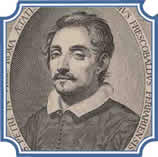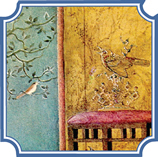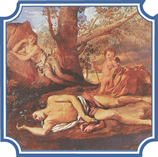

 A program of Frescobaldi's arias and solo instrumental music is like a serving of pure Italian passion. Geert Van Gele (recorder) and Jurgen De bruyn (archlute) bring an antipasto of virtuoso canzonas to the table.
As a main course, the audience is served by soprano Ellen Delahanty and alto Julie Comparini who deliver an insalata mista, picked with great care from the Arie Musicali from 1630. Powerful bouquets arise when songs like Cosi mi disprezzate? ("Do you despise me so?") are being followed by sweet gems like Begli Occhi ("Beautiful Eyes"). A sauce à la Sospiri Ardenti finalises the dish: a dramatized setting...
A program of Frescobaldi's arias and solo instrumental music is like a serving of pure Italian passion. Geert Van Gele (recorder) and Jurgen De bruyn (archlute) bring an antipasto of virtuoso canzonas to the table.
As a main course, the audience is served by soprano Ellen Delahanty and alto Julie Comparini who deliver an insalata mista, picked with great care from the Arie Musicali from 1630. Powerful bouquets arise when songs like Cosi mi disprezzate? ("Do you despise me so?") are being followed by sweet gems like Begli Occhi ("Beautiful Eyes"). A sauce à la Sospiri Ardenti finalises the dish: a dramatized setting...
![]()

a a fairy-tale opera in a nutshell aaa(watch video) (read reviews)

"The Emperor and the Nightinale" by Hans Christian Andersen is the inspiration for the delightful fairy-tale opera by ensemble Sospiri Ardenti. A hit for adults and children alike, this new opera is fully staged and costumed by Gabi Bartels, with a libretto by Hans Wijers and the sparkling music of G. P. Telemann.
The little nightingale is not a beautiful bird, but his song touches everyone’s heart. The empress is delighted with him, until one day she receives a gift of a stunningly decorated mechanical bird. Thrilled by this beautiful machine, she sends the real bird away. But when the empress falls sick, it is only the real nightingale who can charm Death away from her bedside…
An opera about friendship, faithfulness, outward appearances, and the power of music!
This program is an answer to the wishes of many concert organizers who want to present high-quality classical music that captures the imagination of a young public. Since its premiere performance, The Nightingale has captivated both young and old. The many children at the premiere sat spellbound throughout. Children excited by baroque music? By opera? You bet!
![]()

Musical theater with Shakespeare's Twelfth Night and The Tempest aa(read reviews)

The music of two generations of English composers comes vividly to life in a program created around Shakespearean theater music by the ensemble Sospiri Ardenti.
Based on the plays Twelfth Night and The Tempest - two of the best-loved Shakespearean comedies (which were richly provided by Shakespeare himself with musical moments), this program presents dramatized scenes from the plays, incorporating 16th- and 17th-century songs and instrumental works and dance. A simple but effective staging adds drama, humor and visual spectacle!
Another exciting feature of this program is the contrast in musical styles between the first and second half. IN THE FIRST HALF, the phantasmagorical world of The Tempest, inhabited with unearthly beings, is presented with the florid and sweeping music written for the English Restoration staging, approximately one hundred years after Shakespeare's time. IN THE SECOND HALF, the very human comedy of love and folly, Twelfth Night, is presented as Shakespeare himself might have heard it with original Elizabethan music;
Fresh and surprising! A not-to-be-missed event!!!!
Compositions from: Henry Purcell, Robert Johnson, Matthew Locke and John Banister (The Tempest); and from Thomas Morley, John Dowland and William Cornyshe (Twelfth Night)
![]()

a Airs de Court in transformation
 In his Metamorphoses, Roman writer Ovid breaks through the boundaries between the natural and supernatural worlds; gods transform into mortals or animals, men into animals, plants or even into abstractions such as a disembodied voice!
In his Metamorphoses, Roman writer Ovid breaks through the boundaries between the natural and supernatural worlds; gods transform into mortals or animals, men into animals, plants or even into abstractions such as a disembodied voice!
Sospiri Ardenti, in its turn, breaks through the boundaries between early- and contemporary music, between concert and theater, using four of Ovid’s tales. Through tableaux vivants, beautiful 17th-century french airs-de-cour, and magical instrumental music created by Belgian composer Janpieter Biesemans, the nymphs and demi-gods tell their own stories. Staged and costumed by the exciting young German director, Gabi Bartels.
The show opens as a group of archeologists, fascinated by the stories in the Metamorphoses, have searched for and found certain artefacts from Ovid’s world. The contact with these ancient artefacts brings about amazing transformations: the archeologists metamorphose into characters from Ovid’s stories:
Pan, an ugly, goat-footed satyr, tries to win the sprightly nymph, Echo, through dance and music. She, on the other hand, has only eyes for Narcissus, who, in turn, only has eyes for himself, and finally pines away looking at his own reflection until he is transformed into a flower.
Marsyas, another old satyr, finds a flute. Deeply proud of his own ability to play, he challenges Apollo to a musical duel… And finally, the tragic love-story of Apollo and the youth Hyacinth brings the program to a close.
![]()